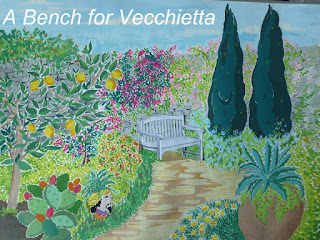A BENCH FOR VECCHIETTA - PART 6
And so it was that I went on
reading, Vecchietta – reading to learn, reading to improve my
English but most of all, reading to find, as you had once told me I
would, that I was not alone in my sorrow – that others had
experienced what I was feeling, lived through grief and regret and
found their way through it.
I did not go to
your funeral, Vecchietta – I knew you wouldn't have wanted me to,
for you always said that love should be shown towards the living. But
I knew that, one day, I had to go to England, to embrace the land
that had made you, to understand what had drawn you back to it and
finally, to talk to your sister.
She and your
brother-in-law were not particularly pleased to see me but they were
hospitable and polite. It was far more than I deserved. I saw the
garden your room had overlooked, I heard the raindrops on the window
and remembered you saying that people would come from all over the
world to see sparrows if they were rare. Well, this Sicilian came,
Vecchietta.
On my last day
there your sister's green eyes, so like yours, looked into mine as
she asked,
“Did you love
her?”
“Yes”, I said,
for I could not hide the truth from her as I had from you. Then she
said she would take me somewhere.
We went to the
crematorium where your ashes had been scattered, Vecchietta. It was
new for me as there are only two crematoria in Sicily, one in Palermo
and now a new one in Messina. I remember that you were shocked when
you read that the Palermo crematorium is often closed because it's
not working properly but to me this seemed perfectly normal.
“You Sicilians,
you even have to have pazienza when you're dead!” was your
comment.
But few Sicilians
choose cremation at the end, though the Roman Catholic Church doesn't
frown on it any more.
You, of course,
were not there in that quiet garden and you had once told me about a
visit you had made to the London garden of remembrance where your
parents' ashes had been scattered so long ago. You'd said you had
realised their spirits were not in a physical place but in your own
heart, wherever you were. And it was that thought which had enabled
you to leave everything and come to live in my country.
I also saw, in that
peaceful place, the benches that people had donated in memory of
loved ones, so that lost souls like me could sit and remember, as I
was doing that day. There they all were, hundreds of garden benches
with bronze memorial plaques, the dead bringing a little comfort to
those left behind. And then I knew what I needed to do.
I finished making
my white bench today, Vecchietta. It has no plaque, for you would
have diapproved of that. The wood is smooth and as I run my hand
over it, for some reason I think of how I ran my fingers over the
palm of your hand the day I told you our affair was over. But I
remember happy moments, too – cooking together, Monte degli Agrumi,
English lessons, coffee and tiramisù.
Now I am growing
older myself, Vecchietta: my son is becoming a man and I'm
encouraging him to read in the hope that he will not be afraid of his
feelings like his father. My daughter has become a beautiful young
woman and if any man does to her what I did to you – or so much as
makes her shed a tear – I, Cicciu the carpenter, will kill him,
Vecchietta.
Life, as you
British say, must go on and I will try to be happy because you wanted
it, Vecchietta: I continue to cook with spices, as you taught me, I
smile at the Sicilian idiosyncracies in which you found so much
humour and I laugh at myself. I can almost hear you saying,
“Look at Cicciu
there! A memorial for me and it's for him to park his arse on!”
And I fancy I can
see your green eyes sparkle and hear you roaring with laughter.
But I also cry,
Vecchietta: here, on your bench in my garden, I sit in the evenings,
read and even find myself talking to the few sparrows that visit me.
And I, Cicciu the carpenter, who did not even cry for my own brother,
cry for you, my Vecchietta.
The end




Comments
Post a Comment